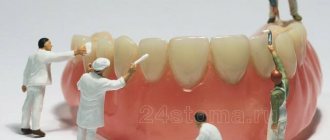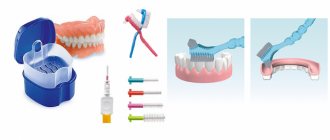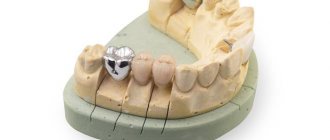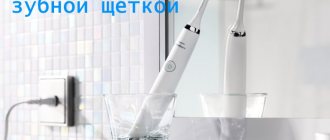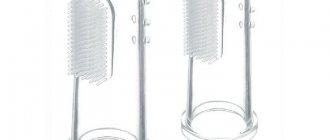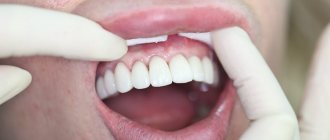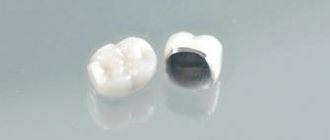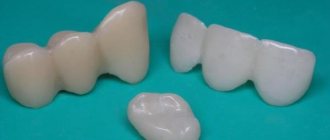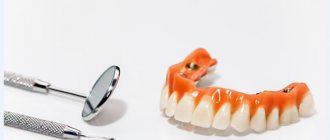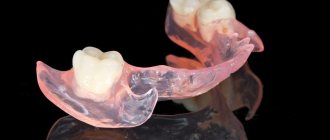For people who use dentures, the most important factor is the quality of their attachment in the oral cavity. Obviously, sliding, falling out structures cause terrible discomfort. This is a major problem for patients and a challenge for dentists. In this article you will learn how dentures are attached and what determines the quality of their attachment.
There are many factors that influence how dentures fit. Firstly, the anatomical features of the patient’s oral cavity.
- Position, tongue mobility
- Load distribution on the bed
- Interaction of the device with the organs of the oral cavity
- Position of teeth and bite
Fixation methods are divided into direct fastening elements and additional elements.
Telescopic crowns
They are more expensive compared to others. The supporting teeth are ground down and a much smaller crown is placed on them. The entire structure is installed on them, which holds tightly thanks to perfectly fitted shapes.
The points described above describe how removable dentures are attached to the presence of supporting living teeth. But how is a denture attached if there are no teeth?
Fixation of dentures
Powder
Pros:
- can be worn with normal or reduced salivation;
- does not change the taste of food and drinks;
- inexpensive.
Minuses:
- it is very difficult to apply the powder evenly;
- Before using the powder, the surface must be moistened;
- After application, you must wait a few minutes for the composition to swell and securely fix.
Gel
Pros:
- holds the prosthesis well;
- safe because it does not contain dyes;
- not sensitive to cold or hot food.
Minuses:
- high price;
- restriction on hot food and drinks;
- high consumption due to the liquid consistency of the gel;
- It does not fix dentures for long, so it must be constantly applied.
Cream
Pros:
- permanently fixes the prosthesis;
- safe, because it contains no toxic substances;
- has a thick consistency, and therefore a small amount is enough for good fixation;
- most often has auxiliary components that provide fresh breath.
Minuses:
- Do not allow the product to come into contact with the mucous membrane - this can lead to irritation;
- After fixation, you need to wait 15 minutes, do not eat or drink.
Spacers for fixing dentures
Pros:
- getting used to the design occurs much faster;
- can be combined with the use of other fixing agents;
- does not affect the height of the bite;
- can be used in the presence of dental deformation;
- safe and universal remedy.
Minuses:
- it costs expensive;
- An allergy may develop to the components of the pads.
Glue
Pros:
- quick adaptation to the design, can be used for temporary prostheses;
- can be used for stroke, dry mouth and neurological pathologies;
- provides fresh breath.
Minuses:
- irritation of the mucous membrane;
- With improper hygiene, the development of pathogenic flora can occur.
Implants
Strong fixation occurs due to the fact that they are installed as artificial analogues of living roots. Removable structures can be attached to implants and can be removed at home.
The best and most popular of those offered are implants and telescopic crowns. But for each patient they are selected individually by a highly qualified orthopedic dentist.
Due to the fact that the oral cavity is constantly mobile, displacement or loss of the structure often occurs. Therefore, there are additional means of fixation.
Solution
In many cases, the doctor can immediately determine that the patient’s removable denture will not hold. Then they choose another type of fastening - non-removable or conditionally removable (removable only by the dentist). This could be, for example, a bridge.
If you still choose a removable prosthesis, since there are contraindications for a fixed prosthesis, then another option is needed.
One of the methods
get rid of the problem - fastening with adhesive gel. The most popular of them is “Korega”. It will relieve the fear of the prosthesis falling out and the constant psychological discomfort associated with it. But it can also bring some inconvenience. For example, the need to periodically remove and apply gel. This will take time. Also, some people find it unpleasant to have a sticky substance in their mouth. But you can get used to it over time. Although rare, allergic reactions do occur. This is a complete contraindication to the use of the gel.
Second exit
– relining of the prosthesis. Over time, the bone tissue underneath the gum atrophies. Therefore, the structure does not fit so tightly. The denture must be sent to a dental laboratory for alteration. Then it will begin to stand normally in the mouth again without falling out.
Another radical solution
– implantation of two or more implants with ball heads. They fix the prosthesis, but at the same time it remains removable. This option allows you to forget about the artificial jaw falling out of your mouth. In this case, there will be no discomfort associated with the use of the adhesive gel. You won't have to spread it on your gums every time and add it throughout the day. There will be no need to experience discomfort due to the presence of a sticky substance in your mouth.
Reviews
Today, modern dentistry is developing rapidly, so the problem of poor fixation can be eliminated quickly and efficiently. By visiting a doctor and choosing the best ways to eliminate the problem, you can achieve the desired results and significantly improve your quality of life.
Have you ever encountered a situation where your denture started to loosen? If yes, then we ask you to share with our readers effective ways to solve the problem in the comments below. Perhaps your review will help many avoid unforeseen situations with removable and semi-removable products.
If you find an error, please select a piece of text and press Ctrl+Enter.
Tags complications prosthetics removable dentures
Did you like the article? stay tuned
No comments yet
How to get used to dentures
After installing the structure, many people experience nausea, excessive salivation, loss or distortion of taste, and discomfort when eating. In addition, there is a violation of diction. Over time, some symptoms become less noticeable or disappear altogether.
There are several rules that will help you get used to dentures:
- you need to wear dentures constantly, even while sleeping;
- read aloud 20-30 minutes a day;
- Chew solid food thoroughly.
If severe pain occurs, consult a doctor immediately. Do not try to adjust the design yourself.
conclusions
From all of the above, it became clear that problems with weak fixation of the prosthesis more often arise against the background of atrophy of the bone tissue of the alveolar processes . This means that the gum area, or rather the bone masses underneath it, become flattened over time, and the suction weakens.
If you do not contact the clinic in a timely manner for corrective work, a gap will form between the structure and the gum tissue, which contributes to the mobility of the orthopedic product.
Atrophic processes in the bone occur slowly, so in some areas of the gum the gap is smaller, in others it is larger. In places where there are bony protrusions, the structure begins to press, and chafing and signs of inflammation are observed.
Due to the loss of bone tissue and the rapid aging of the plastic from which the dentures are made, timely relining is recommended to close the gaps formed and restore reliable fixation.
According to doctors, the best way to fix removable dentures is to install supporting implants. For excellent stabilization, two additional supports are sufficient.
In any case, the choice of the type, method of fixation and measures to eliminate problems that arise always remains with the patient. The main thing is to scrupulously follow the doctor’s recommendations after prosthetics to minimize the risk of loosening the structure.
Clasp denture repair
Repair of a clasp denture A denture, even the highest quality, has a certain operational period during which it maintains high performance. Improper care may result in a shortened service life. Typically, 1 patient out of 10 goes to the dentist for repair of a clasp denture within the first year of use. Common causes of breakdown: violation of operating requirements or a defect resulting from an accident.
Why do dentures break?
Premature wear and, as a consequence, the need for repairs occur as a result of illiterate handling of the structure, for example, if it was subjected to a load that was not specified by the rules or was improperly maintained. However, repair of the clasp prosthesis is required for other reasons:
- during production, the technique of composing elements was violated;
- the cast was made incorrectly and as a result does not fit tightly to the jawbone;
- the supporting tooth has been damaged or for some reason other changes have occurred in the jaw;
- during production, factors such as the patient’s bruxism were not taken into account;
- the prosthesis was exposed to temperature changes;
- The quality of the construction materials does not correspond to the declared ones.
There are several types of defects: the entire structure or part of it breaks; The retainers “fly off” and the artificial chewing element falls out. In any case, urgent repairs are needed in order to be able to chew normally.
What to do if the structure breaks down?
It is not recommended to repair the clasp prosthesis yourself. The slightest inaccuracy leads to even greater damage; therefore, subsequent repairs by technicians will cost more. As a last resort, you can repair minor damage yourself: fix the hook or use special glue at the crack site to prevent further damage.
Important! It is necessary to use only products intended for gluing structures intended to be worn in the mouth. Trying to glue a prosthesis with “Moment” or superglue is not only pointless, but also unsafe for health!
In case of serious damage, restoration without the help of a prosthetist is impossible. At best, you will simply prolong the “agony” of the prosthesis. Moreover, it will be you who will suffer, since an incorrectly assembled structure will seriously injure your gums. It is possible to find a specialized technical laboratory, so it is better to entrust the repair of the clasp prosthesis to professionals who will give a guarantee.
If you have a problem similar to that described in this article, be sure to contact our specialists. Don't diagnose yourself!
Why you should call us now:
- We will answer all your questions in 3 minutes
- Free consultation
- The average work experience of doctors is 12 years
- Convenient location of clinics
Single contact phone number: +7
Make an appointment
It is better to contact dental clinics with their own denture production so that the “false teeth” look as natural as possible after repair and do not rub the gums. In Moscow, such a laboratory and highly qualified specialists are available in the 32 Dent network of clinics.
Clasp denture restoration service: how can technicians help?
- If cracks or “fractures” are found on the structure, gluing and sealing with special materials (dental resins) is carried out. After repair, the prosthesis has its original appearance and is fully functional;
- When an artificial tooth “falls out” of the prosthesis, a new one is made and inserted, or the old one is returned, provided that its integrity is maintained. Repairing such a defect is almost a jewelry job, requiring not only the experience of a technician, but also specialized equipment;
- the saddle-shaped element of the clasp prosthesis is “sealed” with wax so that there is no discomfort when touching the gums.
If precautions are taken and proper care is taken, the repaired structure will last for a long time. However, we should not forget that after repair it has become more fragile and increased load is contraindicated for it. The cost of the work depends on the amount of damage and the complexity of the repair. The price ranges from 1,000 to 10,000 rubles, but in any case, repairing a clasp prosthesis is cheaper than ordering a new one.
If you have a problem similar to that described in this article, be sure to contact our specialists. Don't diagnose yourself!
Why you should call us now:
- We will answer all your questions in 3 minutes
- Free consultation
- The average work experience of doctors is 12 years
- Convenient location of clinics
Single contact phone number: +7
Make an appointment
